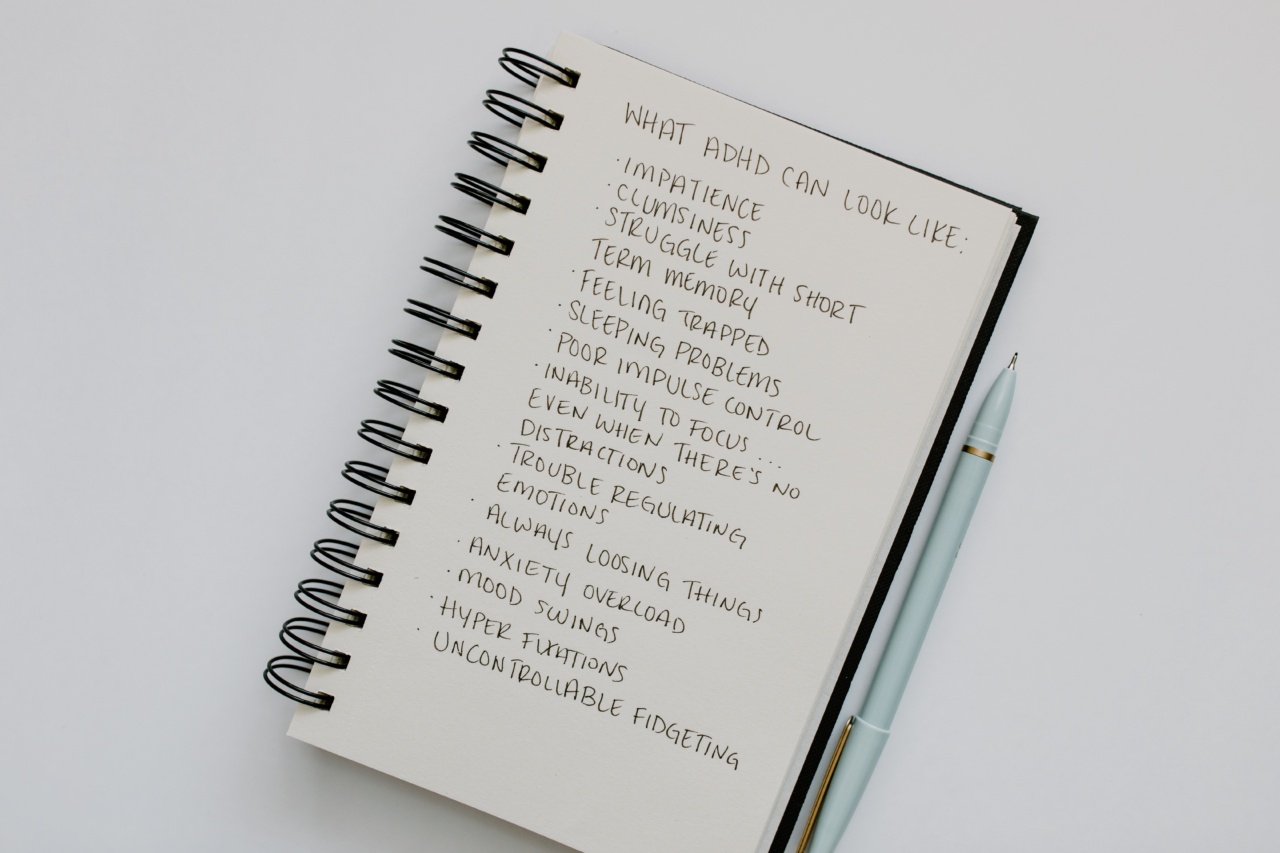Obsessive Compulsive Disorder (OCD) is a mental disorder that affects millions of people around the world.
It’s a condition that causes people to have unwanted and intrusive thoughts and feelings (obsessions) that are usually followed by compulsive actions or behaviors that are intended to reduce the anxiety associated with the obsessions.
If you suspect that you or someone you know might have OCD, here are some of the common signs and symptoms to look out for:.
1. Excessive hand washing or cleaning
People with OCD may wash their hands or clean excessively, sometimes up to 50 times a day, even if their hands aren’t dirty. This behavior is often a result of an obsessive fear of germs or contamination.
2. Checking behaviors
Checking behaviors are another common symptom of OCD. People with OCD may check things repeatedly, such as doors, locks, or appliances, to ensure they are properly closed or turned off.
3. Counting
Counting is another compulsive behavior that can be a sign of OCD. This can involve counting steps, objects, or even thoughts.
4. Excessive organization or arranging things symmetrically
People with OCD may feel the need to arrange or organize items in a specific way, often with a need for symmetry or perfection. This can even extend to how they arrange their thoughts or mental processes.
5. Uncontrollable intrusive thoughts
Obsessions are uncontrollable thoughts, images, or impulses that are unwanted and distressing. These thoughts can include fears of hurting oneself or others, disturbing sexual or violent thoughts, or fears of being contaminated.
6. Repeatedly asking for reassurance
People with OCD may constantly seek reassurance from others, such as asking if they did something right or if everything is okay. This can lead to strained relationships and can become a burden on others.
7. Hoarding
Hoarding is a type of OCD that involves the persistent difficulty in discarding or parting with possessions, regardless of their actual value. This can lead to extreme clutter and an inability to use living spaces effectively.
8. Avoiding certain situations or places
People with OCD may avoid certain situations or places as they can trigger obsessive or compulsive thoughts or behaviors. For example, someone with an obsessive fear of germs may avoid crowded public spaces such as malls or movie theaters.
9. Repeating words, phrases or doing behaviors
Repeating certain phrases, words, or actions multiple times is also a common symptom of OCD. These behaviors are often performed in an attempt to prevent harm from occurring or to reduce anxiety and distress.
10. Ritualistic behaviors
Ritualistic behaviors can become a compulsive part of a person’s life with OCD. This can involve anything from getting dressed in a certain order or repeating certain activities in a specific sequence.
11. Fear of getting sick or contracting a serious disease
Many people with OCD have a fear of getting sick or contracting a serious disease. This can lead to excessive hygiene practices such as hand-washing and using sanitizers.
12. Obsessions with symmetry, patterns, and exactness
Obsessions with symmetry, patterns, and exactness can also be a sign of OCD. This can involve aligning objects on a desk or table in a certain way or feeling distressed if items are out of order.
13. Need for order and control
People with OCD may feel a strong need for order and control in their environment and in their thoughts. This can result in becoming overly controlling and irritable when things are not in order.
14. Difficulty making decisions
People with OCD can have difficulty making decisions, especially if they are worried about the consequences of their actions. This can lead to procrastination or avoiding making decisions altogether.
15. Inability to let go of negative thoughts
People with OCD can find it difficult to let go of negative thoughts or experiences. They may replay past events in their mind, often in an attempt to find meaning or understanding.
16. Need to repeat actions or thoughts
Repeating actions or thoughts is another common symptom of OCD. This can involve anything from re-reading a sentence to walking back and forth through a doorway multiple times.
17. Fear of being responsible for harm
Many people with OCD have an irrational fear of being responsible for harm to themselves or others. This can cause intense anxiety and can lead to avoidance behaviors to prevent the feared harm from happening.
18. Excessive concern with morality or religion
Some people with OCD may have an excessive concern with morality or religion. This can involve obsessive thoughts about right and wrong or a fear of committing a sin.
19. Fear of losing control
People with OCD may have a fear of losing control over their thoughts or actions. This can lead to compulsive behaviors in an attempt to regain control.
20. Fear of losing something important
People with OCD may have a fear of losing something important, such as a key or a document. This can lead to repetitive checking behaviors to ensure that the item is still in their possession.
21. Need to confess or apologize
Some people with OCD feel a strong need to confess or apologize for even minor mistakes. This can lead to strained relationships as others may become frustrated by the constant need for validation and reassurance.
22. Paranoia
Paranoia is a common symptom of OCD. People with OCD may have irrational fears about being watched or followed, or may experience paranoid thoughts related to specific events or situations.
23. Self-injurious behaviors
Some people with OCD may engage in self-injurious behaviors, such as cutting or burning themselves. These behaviors are often a way to temporarily relieve the anxiety associated with the obsessive or compulsive thoughts.
24. Irritability
People with OCD can become irritable and easily frustrated with others, especially if their obsessive or compulsive behaviors are challenged or disrupted.
25. Sleep disturbances
People with OCD can experience sleep disturbances due to their obsessive or compulsive thoughts, which can lead to feelings of anxiety and distress.
26. Substance abuse
Some people with OCD may turn to substance abuse as a way to cope with the anxiety and distress associated with their disorder. This can lead to further complications and can exacerbate symptoms.
27. Depression
Many people with OCD also experience symptoms of depression, such as feelings of hopelessness, sadness, and loss of interest in activities.
28. Social isolation
People with OCD can become socially isolated, as they may feel embarrassed or ashamed by their thoughts or behaviors. This can lead to strained relationships and feelings of loneliness and isolation.
29. Eating disorders
Some people with OCD may also develop eating disorders, such as anorexia or bulimia. These behaviors are often a way to gain a sense of control over their lives and their anxiety.
30. Suicidal thoughts or behaviors
Finally, people with OCD may experience suicidal thoughts or engage in suicidal behaviors. This is a rare occurrence, but it can happen in severe cases where the individual feels overwhelmed by their symptoms and unable to cope.
Conclusion: Seek Treatment for OCD
If you recognize any of these signs or symptoms in yourself or someone you know, it’s important to seek help.
OCD is a treatable condition, and there are effective therapies and medications that can help manage the symptoms and improve quality of life.
If you suspect that you or someone you know might have OCD, talk to a healthcare professional, such as a psychiatrist or therapist, who can help diagnose and treat the condition.


























